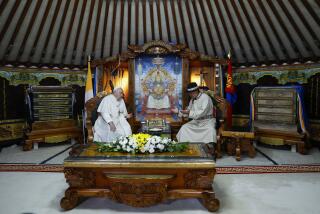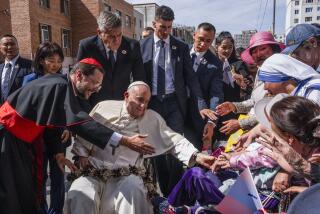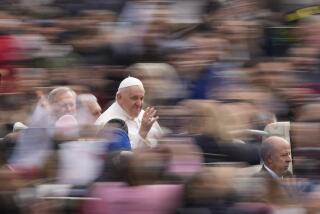Vatican Aide’s Visit May Help Ties With China
VATICAN CITY — One of the Vatican’s most senior trouble-shooters, a patrician 70-year-old French cardinal and perhaps an unlikely spectator at a sporting event, is on his way to Beijing today to attend China’s national athletic games.
That is the official story, but behind it could lie a 1990s variation on Ping-Pong diplomacy that may ease decades of enmity between China’s Communist government and the Holy See.
The visit climaxes a period of cautious, private maneuvering between the world’s largest country and the world’s largest church.
Its timing is doubly significant. Later this month, China will learn whether the most frenzied public relations campaign in its history has persuaded the International Olympic Committee to choose Beijing as the site of the 2000 games.
Cardinal Roger Etchegaray, who left Rome on Thursday, has long been papal point man in places where Pope John Paul II cannot go himself for political reasons. In the past few years, the French prelate has made quiet visits to Bosnia-Herzegovina, Lebanon, Vietnam and Cuba as Vatican emissary.
Head of the Pontifical Commission for Justice and Peace, which is the Holy See’s link with the Third World, Etchegaray is the first senior Vatican official to visit China since the victory of communism there in 1949. On Saturday, the tall, graying Etchegaray is to attend the opening ceremonies of China’s 7th National Games in Beijing at the invitation of Wu Shaozu, president of the games’ organizing committee, the Vatican announced Thursday.
“During his stay in Beijing, the cardinal will also meet members of the government,” said papal spokesman Joaquin Navarro, evoking memories of the stunning invitation to an American Ping-Pong team that broke the ice between China and the United States in the early 1970s.
China broke relations with the Holy See in the early 1950s, killing or expelling many priests and jailing others, sometimes for decades. Catholics who remained faithful to the Pope were also repressed as their church was replaced by a government-controlled Chinese Patriotic Catholic Assn.
In conversations with a visiting reporter in Beijing and Shanghai last spring, Chinese Catholic priests and community leaders spoke guardedly about their religious role in a Communist society, stressing that “we are an association, not a church.”
The association names its own bishops with government approval and functions autonomously without any ties to the Vatican.
Vatican officials say the association has about 5 million members, with the largest number in Shanghai. There are also perhaps 5 million “secret” Catholics faithful to Rome who practice their religion clandestinely, according to Vatican officials.
Since the collapse of communism in Europe, China is now the biggest blank on the Pope’s remarkable map of pastoral travels that have taken him to more than 100 countries in 15 years.
As recently as June, John Paul expressed a “strong desire” to visit China, and Vatican officials have since acknowledged that conversations have been under way with the Chinese for some time.
The visit to the Chinese capital by one of the most senior Curia cardinals is “testimony to the sincere desire of the Holy See to establish contact . . . and ties of respect, friendship and cooperation with the Chinese people,” said spokesman Navarro.
More to Read
Sign up for Essential California
The most important California stories and recommendations in your inbox every morning.
You may occasionally receive promotional content from the Los Angeles Times.










